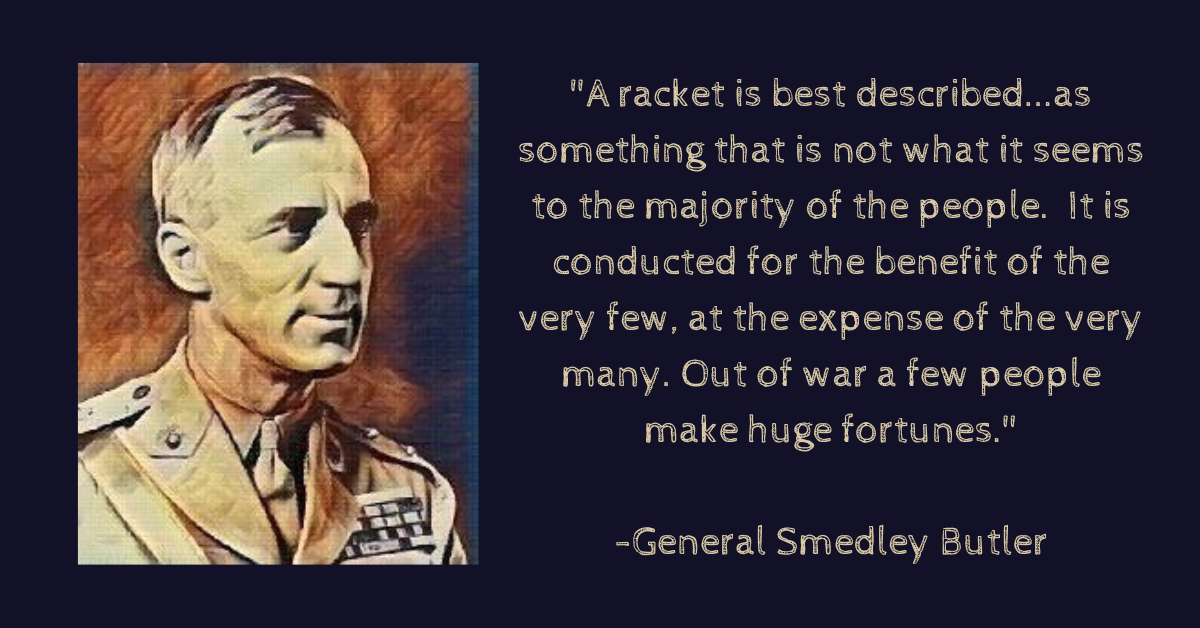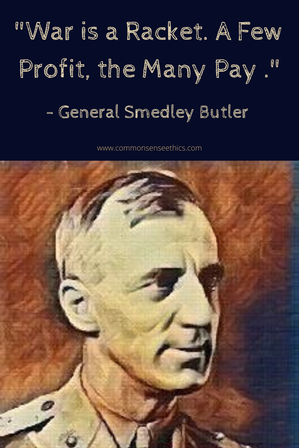Smedley Butler was one of the most decorated generals in American history, having served during the Mexican Revolution and World War I. He won 15 medals, including five for heroism, and the Medal of Honor twice. Butler's moral courage was a match for his physical courage. When he retired from the military, he took the unusual step of pointing out that war is a racketeering scheme in his 1935 book, War is a Racket. What did he mean by this?
I have been planning to write this post for for several years, but it seems especially timely now with the war in Ukraine happening. In what follows, I will break down Butler's message and explain why it is the key to understanding the deeper reasons (with rare exceptions) that nations go to war, along with the true costs of war to regular people.
A Decorated General, A Change of Heart
Butler wrote that while he long suspected that war is a racket, he had never really thought on his own before leaving the military. Only during civilian life was he able to see war for what it is. But looking back on his career, truthfulness compelled him to speak. About his military career, he writes:
I helped make Mexico, especially Tampico, safe for American oil interests in 1914. I helped make Haiti and Cuba a decent place for the National City Bank boys to collect revenues in. I helped in the raping of half a dozen Central American republics for the benefits of Wall Street. The record of racketeering is long. I helped purify Nicaragua for the international banking house of Brown Brothers in 1909-1912. I brought light to the Dominican Republic for American sugar interests in 1916. In China I helped to see to it that Standard Oil went its way unmolested.
During those years, I had, as the boys in the back room would say, a swell racket. Looking back on it, I feel that I could have given Al Capone a few hints. The best he could do was to operate his racket in three districts. I operated on three continents.
Why War is a Racket
"War is a racket. It always has been. It is possibly the oldest, easily the most profitable, surely the most vicious. It is the only one international in scope. It is the only one in which the profits are reckoned in dollars and the losses in lives. A racket is best described, I believe, as something that is not what it seems to the majority of the people. Only a small 'inside' group knows what it is about. It is conducted for the benefit of the very few, at the expense of the very many. Out of war a few people make huge fortunes.
In the World War [I] a mere handful garnered the profits of the conflict. At least 21,000 new millionaires and billionaires were made in the United States during the World War. That many admitted their huge blood gains in their income tax returns. How many other war millionaires falsified their tax returns no one knows.
How many of these war millionaires shouldered a rifle? How many of them dug a trench? How many of them knew what it meant to go hungry in a rat-infested dug-out? How many of them spent sleepless, frightened nights, ducking shells and shrapnel and machine gun bullets? How many of them were wounded or killed in battle?
Out of war nations acquire additional territory, if they are victorious. They just take it. This newly acquired territory promptly is exploited by the few – the selfsame few who wrung dollars out of blood in the war. The general public shoulders the bill. And what is this bill?
This bill renders a horrible accounting. Newly placed gravestones. Mangled bodies. Shattered minds. Broken hearts and homes. Economic instability. Depression and all its attendant miseries. Back-breaking taxation for generations and generations."
Butler writes that soldiers pay the highest price, in terms of death, injury, mental illness and so forth. And soldier's families suffer as soldiers themselves suffer.
The Use of Propaganda
In the World War, we used propaganda to make the boys accept conscription. They were made to feel ashamed if they didn't join the army. So vicious was this war propaganda that even God was brought into it. With few exceptions our clergymen joined in the clamor to kill, kill, kill. To kill the Germans. God is on our side. It is His will that the Germans be killed. And in Germany, the good pastors called upon the Germans to kill the allies ... to please the same God. That was a part of the propaganda, built up to make people war conscious and murder conscious.
Beautiful ideals were painted for our boys who were sent out to die. This was the "war to end all wars." This was the "war to make the world safe for democracy." No one mentioned to them, as they marched away, that their going and their dying would mean huge war profits. No one told these American soldiers that they might be shot down by bullets made by their own brothers here. No one told them that the ships on which they were going to cross might be torpedoed by submarines built with United States patents. They were just told it was to be a "glorious adventure."
And Butler goes on to point out the immense profits to be made during wartime which are disguised (rightly or wrongly) as patriotism:
"The normal profits of a business concern in the United States are 6, 8, 10, and sometimes 12%. But war-time profits – ah! that is another matter – 20, 60, 100, 300, and even 1,800% – the sky is the limit. All that traffic will bear. Uncle Sam has the money. Let's get it. Of course, it isn't put that crudely in war time. It is dressed into speeches about patriotism, love of country, and 'we must all put our shoulders to the wheel,' but the profits jump and leap and skyrocket – and are safely pocketed."
Which Wars are Just?
"But what does it profit the men who are killed? What does it profit their mothers and sisters, their wives and their sweethearts? What does it profit their children? What does it profit anyone except the very few to whom war means huge profits? Yes, and what does it profit the nation?
Take our own case. Until 1898 we didn't own a bit of territory outside the mainland of North America. At that time our national debt was a little more than $1,000,000,000. Then we became 'internationally minded.' We forgot, or shunted aside, George Washington's warning about "entangling alliances." We went to war. We acquired outside territory. At the end of the World War period, as a direct result of our fiddling in international affairs, our national debt had jumped to over $25,000,000,000."
Considering Butler's arguments forces us to examine whether things have really changed in the last 100 years. I would argue that they have not.
Butler's complete work is published in a short, accessible volume entitled War is a Racket. The book is a most important read that I highly recommend if you want a better understanding of history, current international affairs, and the true, grotesque nature of war.
*This post contains Amazon Associate links. I may earn a small commission if you buy a book.
~
Read Next:
What the Game of Thrones Ending Really Means
What Everyone Needs to Know About Violence and Self Defense
Read These 5 Books for a Deeper Understanding of Politics











